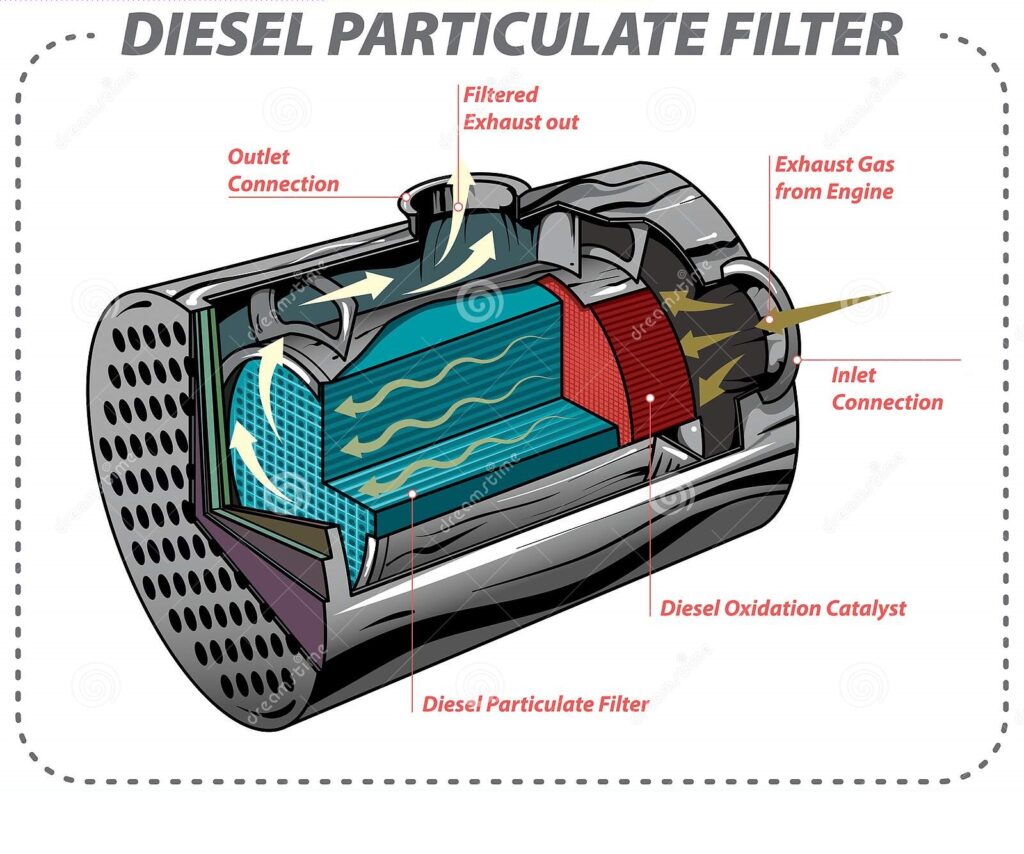DPF MAINTENANCE GUIDE
HOW A DIESEL PARTICULATE FILTER WORKS

Passive Regeneration
Passive DPF regeneration is designed to take place automatically on main roads at higher speeds, when the exhaust temperatures are high

Owner Action
Passive regeneration requires no specific action from owner, other than trying to build into their journey plans some regular higher speed extra-urban journeys Ask for low-sulphur oil during routine servicing

Active Regeneration
When the ECU calculates soot loading in the DPF to be typically 45%+ the dashboard DPF symbols lights up Carry out and active regeneration as per owners manual

Owner Beware
Excessive regeneration attempts is indicative of other problems Always refer to a garage or professional mechanic Oil dilution will occur during regeneration, which may increase oil change frequency

Professional Diagnosis
Continued and increasing frequency active regenerations may be down to urban driving style, or a vehicle fault. A full test and diagnosis is required to eliminate any potential mechanical or electronic problem

Forced Regeneration
If the diagnostic checks show no mechanical, or electronic failure, then a forced regeneration will need to be carried out to try and reduce soot levels within the DPF

Soot -v- Ash
Soot is combustible and can be burnt off. Ash is incombustible and must be removed from the DPF through an off-vehicle cleaning process.

Garage Tip
If soot levels are excessively high, or there is high ash content then forced regeneration will not work Continued attempts may cause damage to the engine, if the back pressure is too high

Assisted Regeneration
To help clear excess soot from the DPF, chemical additives are available These normally work by reducing the regeneration temperature and only clear soot, not the ash

Professional Solutions
DPF Specialists combine detailed diagnostic with assisted regeneration This has a much better chance of clearing soot, rather than shop brought DIY miracle cures

Garage Tips
If the DPF soot levels are excessively high and/or the vehicle mileage is +80,000 then its highly likely that’s the ash levels are high too. The best solution is for the a professional clean off-vehicle.

Garage Beware
Emissions from forced regenerations are harmful and must be completed away from public areas Static regeneration’s could be in violation of the Clean Air Act

Off-Vehicle Cleaning
High ash levels, causing DPF blockage cannot be removed by regeneration or any chemical process. The ONLY way to restore the DPF is to remove it and have it professionally cleaned off-vehicle

Cleaning Process
Professional off-vehicle cleaning is a highly sophisticated process that safely cleans and restores the DPF filter by aqueous backwashing, drying and testing, combined with advanced diagnostics

Cleaning Success
Off-vehicle cleaning is 98%+ successful in restoring the filter to virtually new condition Professional off-vehicle cleaning centres typically guarantee the clean for 12 months guarantee

Replacement DPF
It’s highly likely a blocked DPF can be fully cleaned and restored However, if the DPF has a damaged or broken core, then the filter must be replaced
Call Today For A Free Estimate
DPF MAINTENANCE
TREAT THE PROBLEM NOT THE SYMPTOMS
- A typical DPF is constructed so that the exhaust gases enter a cell, which is plugged at the far end. The gasses are able to escape through the sidewall of these cells, leaving behind solid particulate matter in the form of residual soot and ash.
- Through the regeneration process the soot is regularly burnt off and turned into ash. Over time these ash levels build up and eventually (typically over 60K – 80k miles+) the filter becomes blocked.
- Some filters can become blocked much sooner if regeneration fails and ash bridging occurs, blocking off the cells prematurely.
- The only way to clear the ash (and any excess soot that cannot be burnt off through regeneration) is to remove the DPF from the vehicle and clean the DPF cells in the opposite way to the exhaust flow.

